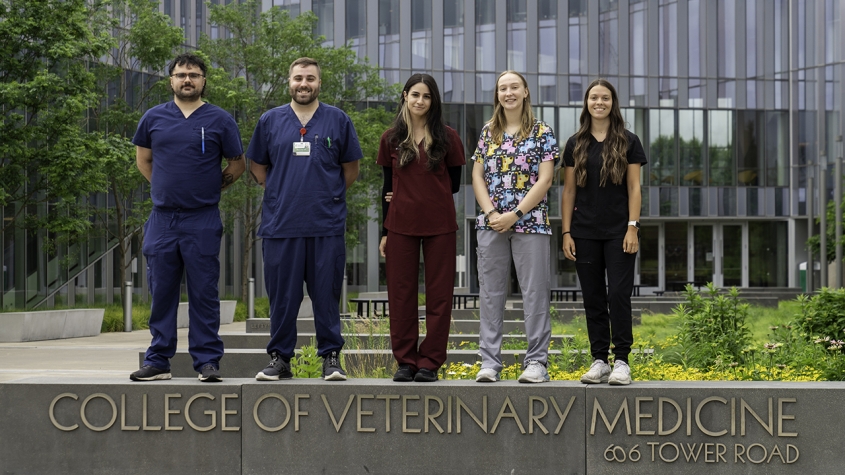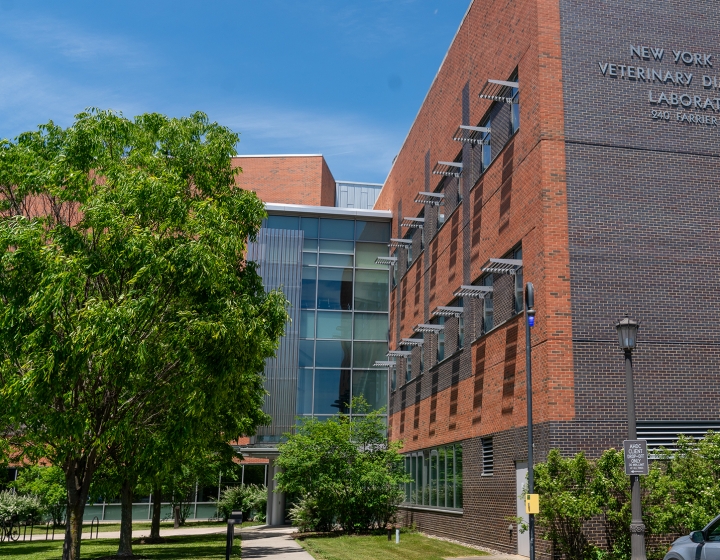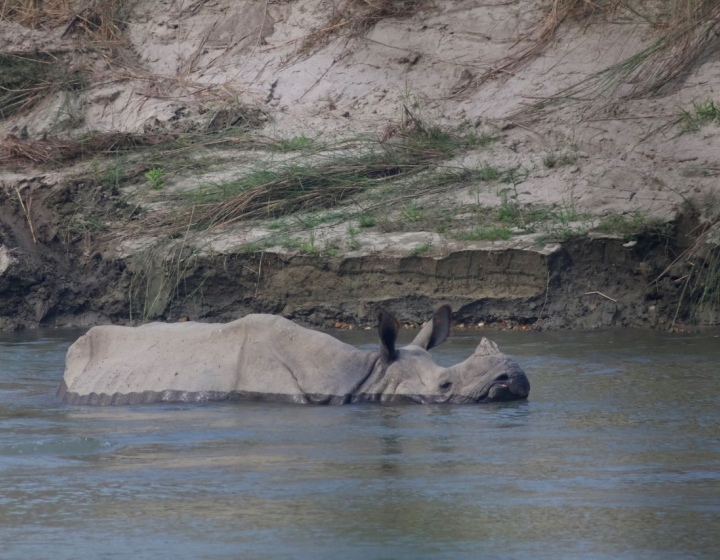Q&A: Meet our LVT interns
This week, the Cornell University Hospital for Animals (CUHA) celebrates Staff Appreciation Week, which honors the efforts of our hardworking, talented staff. Oct. 13-19 also marks National Veterinary Technician Week, so we invited members of the Cornell Licensed Veterinary Technician (LVT) Internship Program to answer a few questions about their experience.
The LVT Internship Program at the Cornell University Hospital for Animals (CUHA) supports each intern's professional growth and technical skill development. Our interns do core rotations in small and large animal services like emergency, critical care, anesthesia, surgery, dentistry, internal medicine, theriogenology, cardiology, community practice, imaging, pharmacy and client services, as well as many elective rotations in additional areas. Throughout the internship, participants build their skills in physical exams, restraints, injections, in-house diagnostics, surgical prep and assistance, imaging orientation and acquisition, nursing care and more.
Hear from Jessalyn Corson, Faith Flood, Paul King, III and Nicole Krgin about life in the LVT Internship Program.
What’s unique about the LVT internship at Cornell?
Corson: The LVT internship is unique in the way that you get to work in a particular department for about a month for each rotation, which is the perfect amount of time to really see and work as a LVT in that department with supervision of another LVT.
Flood: The LVT internship is unique in that we don't learn just one area. We rotate every six weeks or so around the hospital into different areas. Which means we are learning different skills depending on the area and advancing our knowledge of that specific area as well.
King: What's unique about the program is how helpful it is. Being at a teaching facility helps tremendously, and being in such an understanding learning environment adds tremendously to the experience of coming straight out of school and into a working position, being able to perform nearly as well as others that have been in the profession for years.
Krgin: The LVT internship at Cornell is incredibly unique. It’s rare to get an opportunity like this where you are able to test the waters of so many different services and specialties, all while in an environment that is dedicated to the pursuit of knowledge. You are able to make connections with so many veterinary professionals because of the large volume of staff and the consistent schedule rotation. I have been working at Cornell for about four months now, and I have already learned so much and have developed relationships with my coworkers that I will cherish forever. Before this internship, I had little interest in working a 24/7 service such as ER or ICU, but after rotating through those services, I have discovered that I love critical care and that I don’t mind working overnights. I would have never discovered that about myself without this experience.
What’s something important that you’ve learned since you’ve been in the internship?
Corson: Some important things that I have learned since being here are the importance of teamwork and always doing your best no matter what the job is. Another important thing I've learned is how important it is to be able to learn quickly.
Flood: Since being in the internship, I've learned that time management and confidence are important things to being a LVT. They're not skills taught in school but they're just as important as the technical skills of being an LVT.
King: Something important that I have learned is speaking up and knowing your own limits. Transitioning from school, we practice skills, most literally only once, and in this environment it's welcoming being able to tell your supervisor that you've placed a catheter, or collected blood once, and they will do everything in their power to get you those experiences to be a better tech.
Krgin: Something significant that I’ve learned from this internship is that it is important to put yourself out there and try the things that you might not necessarily want to do. I was dreading working the overnight shift in the ER, but so far I have found that to be one of my favorite rotations.
What's the most important part about being an LVT?
Flood: The most important part of being an LVT is that you care and speak up about your patients. Asking questions to make sure they are taken care of in the best possible way is part of that. As an LVT you are there to advocate for you patients and make sure they are not overlooked. I think caring about your patients is one of the most important parts of being an LVT.
King: The most important part of being an LVT from what I've experienced in the past few months of working as one, is patient care. Working in the nursing units, and especially ER, is trying to help them, being the most comfortable they can be in such a stressful environment, and trying to help them without exerting them so they can be worry-free during the most stressful part of their life.
Krgin: The most important part about being an LVT is to maintain your empathy. I know that after working for 10 hours that you’re tired and nothing sounds better than your bed, but our patients depend on us for their care. Most of the time our patients come in either scared or in pain, and just because I’m exhausted does not mean I can slack off with their care. From the moment I step foot into the hospital to the moment I leave, my number one priority is the well-being and happiness of these animals. We take an oath as veterinary professionals and it is our responsibility to work at a certain standard.






